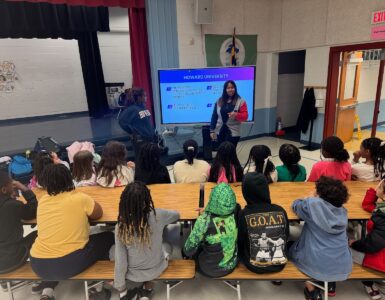
I’ve never been the “new kid.” I never moved to different city or even changed school districts. Yet whenever someone new would pop in class, I always wondered what it was like to have to start all over again and make friends. I generally tried to be nice to them for good karma just in case I was ever in their position. I couldn’t fathom what it felt like knowing everyone knows everyone—but you. Or at least, that was true until I got to Howard University.
Before coming to Howard as a domestic exchange student from Stanford University, I was petrified that I would become a loner who spent 20 out of 24 hours in my room and sit alone everyday in the dining hall, not by choice, but because no one wanted to sit next to me. Luckily, most of my fears were unfounded. I’ve been fortunate enough to find cool kids to run around and get lost with in Washington, D.C., yet I still wonder how we got to that point.
But on one unassuming October weekend, I made a friend.
It was a Saturday morning, and I had an hour to get to the MegaBus parking lot to meet my friends so we leave for fun times in Philly. Sadly, the Metro train stops by campus were closed for maintenance during the holiday weekend. Metro promised free shuttles to compensate for the atrocity, but I arrived at the nearest stop with my bags only to see the shuttle pull off. A little disheartened, I didn’t have time to wait for the next one, so I decided to walk to the next stop a few blocks down.
My dorm is not located in the nicest part of the district. D.C. is historical and has some places worth visiting, but I live with the people (though it’s nothing to fear with an angry face and a quick pace). About halfway between the Shaw-Howard and Mount Vernon stops, I saw these dudes on the corner. Dudes on the corner are nothing unusual, but these dudes looked extra grimy. At that same moment, I saw a taxi pull up behind me. The driver, who is more than old enough to be my grandfather, asked me if I needed a ride.
I looked at my options: Walk past these crusty men who will hit on anything that looks female, or pay the price of the taxi. Taxi won.
At first, I was a little surprised when he encouraged me to sit in the front seat. My mind instantly jumped to thinking this is how all those overly dramatic Lifetime movies start. But when I saw the state of the back seat, my hesitation ebbed.
Once inside, he immediately told me that I looked like one of his people. I didn’t know how to respond, so he clarified by having me guess what East African country we were from. (I wrongly guessed Ethiopia.) I didn’t know I was Somalian, but you learn something new about yourself everyday.
As he continued driving, he asked me all the basic get-to-know-you questions and I kept one eye on the meter that he never turned on. He also proceeded to tell me about his hope to enroll in some business program run by Georgetown for older returning students and how it felt to meet someone he could call a friend. He even went as far as to make a deal with me; he would teach me Arabic if I helped improve his writing skills for the program. He even taught me two whole words I can’t pronounce to seal the deal.
Irene Levine, friendship expert and creator of the TheFriendshipBlog.com, says that “Friendships help us define ourselves.” This is especially important for people when they are in unfamiliar environment like a new job, new school or new city. For most, Levine believes that it is the relationships we make – like friendships – that affirm our own hopes and dreams.
Yet, as important as these relationships are, they are not always easy to cultivate and maintain. Sometime I really wonder how I ever made friends with anybody past kindergarten. Did I tell her I liked her shoes and that was what did it? Maybe we bonded over having fruit roll-ups during snack time? Or did we just look at each other and smile?
Back then, it seemed so easy. All you had to do was walk up to a kid and ask her if she want to play with you. If she said yes, and followed the basic unspoken rules of freeze tag, by the end of the game you asked her to be friends. And done, new friend made. If you got real close you even invited her over to your house (but that was only for the real special people).
That little move doesn’t seem to work anymore. Even though I still know all the rules for five versions of tag, no one really wants to play that anymore. And if someone just invites me over to his house (or room) randomly after talking for less than 10 minutes, my first thought is this person:
a.) is a creeper
b.) wants a booty call in the middle of the afternoon.
Either way, I’m not as inclined to say “yes” to such a request as I was when I was 7 years old.
“Building friendships requires self-confidence and good interpersonal skills,” Levine says. This can sometimes be easier said than done, especially when an individual is shy and not extroverted. Nonetheless, some universal things can be done to help a friendship grow, Levine notes.
“Act friendly and warm,” she suggests. “Be interesting and interested in other people. Take time before you provide or ask TMI (too much information); friendships need to develop over time.”
And sometimes they can happen in what seems like an instant. By the time, I had arrived at the MegaBus parking lot—early—I actually felt as if I had made a friend, whether I had wanted to or not. In retrospect, it may not have been the brightest idea, but deep down inside, I genuinely believe in the kindness of strangers. (You can judge me on my naiveté later.)
Nonetheless, I left the taxi happy about the decision I made, though it’s probably not one I’ll do again. That little encounter taught me something valuable. Everyone is a stranger until you make him or her a friend. Even your best buddy since the fourth grade was just some shy kid in the corner until your teacher made you sit next to her in class, and you realized you both love Sailor Moon and bagels.
So if I can make a friend with Mohammed, the taxi driver, just think of whom you could meet.










Recent Comments